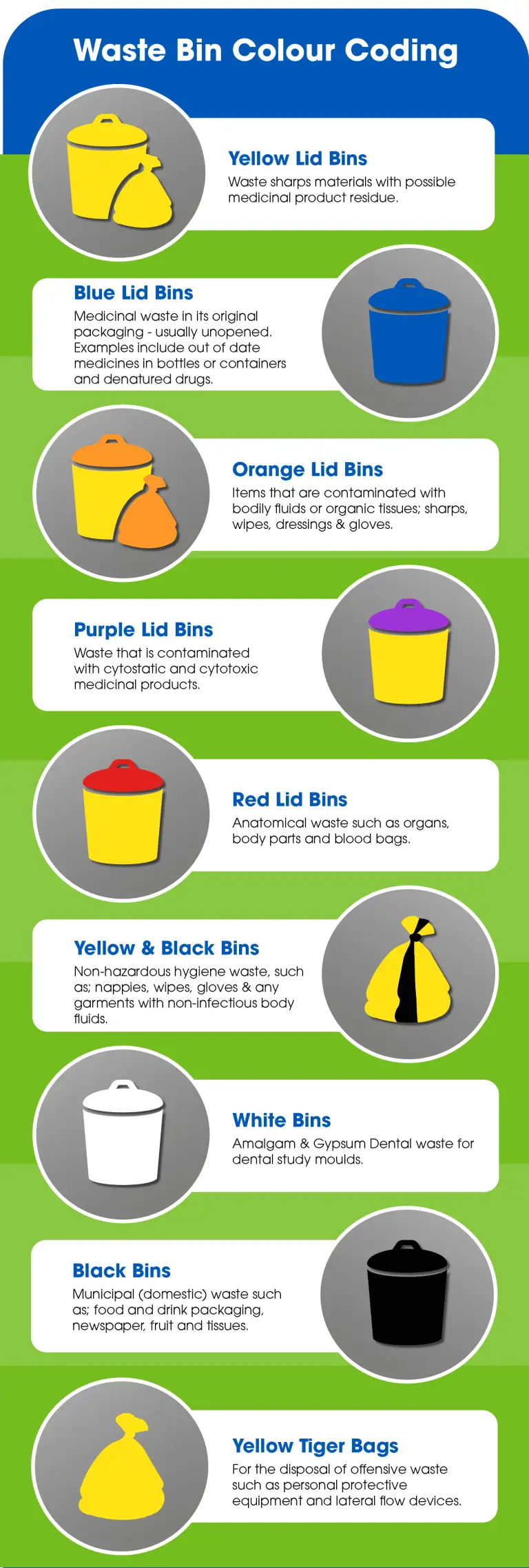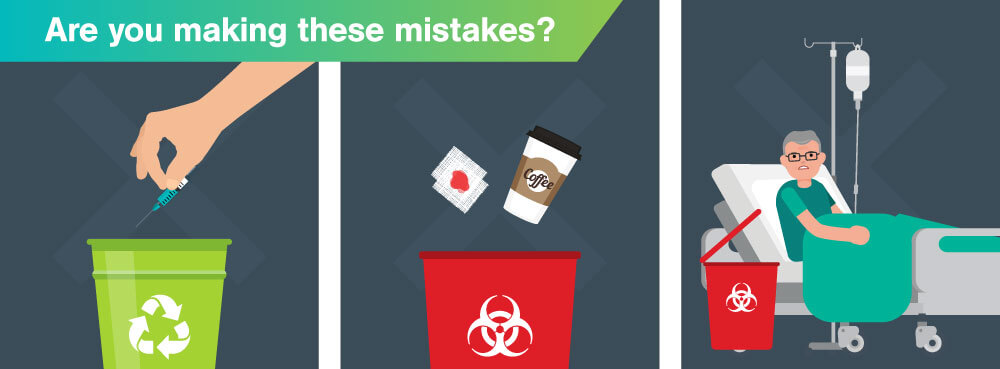Reliable Approaches of Medical Waste Disposal
Effective approaches of medical garbage disposal are vital in preserving public health and wellness and ecological safety. Clinical waste, including sharps, pathological waste, and pharmaceutical waste, need to be managed and thrown away appropriately to stop the spread of infections and safeguard the environment. This calls for adherence to strict guidelines and the implementation of specialist waste monitoring methods.
Correct segregation of medical waste, risk-free and secure storage space, efficient therapy and sanitation approaches, and environmentally-friendly disposal options are vital elements of an efficient medical waste disposal system. Specialist waste monitoring solutions play an important duty in making certain conformity with regulations and decreasing the threats related to incorrect disposal. By utilizing these methods, medical care centers can add to a more secure and cleaner atmosphere while protecting the health of the community.
Proper Segregation of Medical Waste
Appropriate partition of medical waste is important for guaranteeing the efficient and safe disposal of these possibly unsafe materials. Medical waste describes any waste created during healthcare tasks, such as medical facilities, facilities, labs, and study centers. It includes a vast array of materials, such as utilized needles, syringes, polluted dressings, ran out or extra medications, and biological materials.
By segregating medical waste, healthcare centers can decrease the threat of infections, injuries, and environmental contamination. The process entails classifying waste into different kinds, such as sharps, transmittable waste, pharmaceutical waste, and non-hazardous waste. Each kind calls for specific handling, packaging, and disposal techniques to stop direct exposure to health care workers, waste administration workers, and the general public.
To make certain appropriate segregation, medical care centers ought to develop clear guidelines and provide adequate training to employee. This consists of informing employees on the different waste classifications, correct product packaging strategies, and making use of appropriate containers - WasteX Medical Waste Disposal. Additionally, clear signs and color-coding systems can be implemented to help with the recognition and segregation of different waste kinds
Safe and Secure Storage of Medical Waste
Safe and safe and secure storage of clinical waste is important for preserving the integrity and containment of potentially unsafe products. Proper storage not only safeguards medical care employees and the basic public from exposure to unsafe materials but likewise protects against environmental contamination.
To make sure secure storage, medical centers ought to follow certain standards. Waste ought to be kept in leak-proof and puncture-resistant containers that are classified appropriately. These containers should be firmly secured to stop any kind of leak or spills. Additionally, the storage space area need to be hard to reach and protected to unauthorized personnel, minimizing the risk of unintentional exposure.
Proper segregation of clinical waste is likewise necessary for risk-free storage space. Different kinds of waste, such as sharps, transmittable materials, and pharmaceutical waste, should be divided to stop cross-contamination. This partition can be achieved through using color-coded bins or containers.
Normal surveillance and evaluation of the storage area are essential to identify any type of possible dangers or violations. This consists of checking for signs of damages or damage in the containers, making sure proper air flow, and keeping an eye on temperature level and humidity levels.
Efficient Treatment and Sanitation Techniques

One frequently utilized treatment method is autoclaving, which includes subjecting the waste to high-pressure heavy steam at temperature levels over 121 degrees Celsius. This procedure properly eliminates microbes and damages contagious representatives, making the waste secure for more disposal. Another approach is incineration, which entails burning the waste at heats. Incineration not just eliminates bacteria however also decreases the waste volume with burning.
Chemical sanitation is one more efficient approach for treating clinical waste. This technique entails using disinfectants such as chlorine compounds, phenolic substances, or hydrogen peroxide to kill or inactivate virus (WasteX Medical Waste Disposal). Chemical disinfection is commonly used for liquid waste, such as laboratory examples or bodily fluids
Over the last few years, different treatment techniques such as microwave sanitation, irradiation, and organic therapy have actually additionally gotten interest. These methods supply advantages such as minimized environmental impact and power intake contrasted to conventional techniques.
Environmentally-friendly Disposal Options
In the world of clinical waste disposal, considering environmentally-friendly choices is important. Medical care facilities produce a considerable quantity of waste, consisting of transmittable materials, drugs, and chemicals, which can pose serious risks to human health and wellness and the environment if not taken care of effectively. Fortunately, there are several environmentally-friendly disposal options offered that can help reduce these threats.
Recycling medical waste includes setting apart and refining certain materials for reuse or repurposing. Additionally, some healthcare centers have applied recycling programs for specific clinical devices or devices, more lowering waste generation.
Another environmentally-friendly disposal option is waste-to-energy conversion. This technique includes converting clinical waste right into power through procedures like incineration or anaerobic food digestion. medical waste removal service. Incineration, when done effectively with sophisticated modern technologies, can generate energy while minimizing harmful discharges. Anaerobic food digestion, on the various other hand, breaks down organic waste in the absence of oxygen, generating biogas that can be made use of for electrical power or heat generation.

Benefits of Expert Waste Administration Services
One significant benefit of expert waste monitoring solutions is the boosted effectiveness in disposing and handling of clinical waste. By using professional waste management solutions, right here medical care centers can ensure that all clinical waste is taken care of and disposed of correctly, minimizing the threat of contamination and the spread of illness.
Expert waste monitoring solutions use knowledgeable and skilled employees who are well-informed about the policies and standards for medical waste disposal. They have access to specific equipment and devices that enable them to handle different sorts of medical waste securely and successfully. These solutions additionally have reputable treatments and methods in position to make certain that waste is segregated, packaged, transported, and disposed of in compliance with local, state, and federal regulations.
Additionally, expert waste monitoring services can offer medical care facilities with thorough waste management solutions. They can use solutions such as waste collection, transportation, disposal, and treatment, customized to the certain needs and requirements of the center. This removes the burden of handling waste inside, permitting medical care team to concentrate on providing high quality client treatment.
Conclusion
In final thought, reliable methods of medical waste disposal involve correct partition, secure storage, therapy and disinfection, and environmentally-friendly disposal alternatives. These approaches ensure the safe handling and monitoring of clinical waste, preventing the spread of infections and protecting the setting.
Medical waste, including sharps, pathological waste, and pharmaceutical waste, must be handled and disposed of properly to avoid the spread of infections and shield the setting.Proper segregation of medical waste, protected and secure storage, efficient treatment and sanitation approaches, and environmentally-friendly disposal options are vital parts of an effective medical waste disposal system. The procedure entails categorizing waste into various kinds, such as sharps, transmittable waste, pharmaceutical waste, and non-hazardous waste. By using specialist waste management solutions, healthcare facilities can make sure that all medical waste is managed and disposed of effectively, lessening the danger of contamination and the spread of diseases.
Specialist waste management solutions employ knowledgeable and experienced personnel that are knowledgeable about the guidelines and standards for clinical waste disposal.